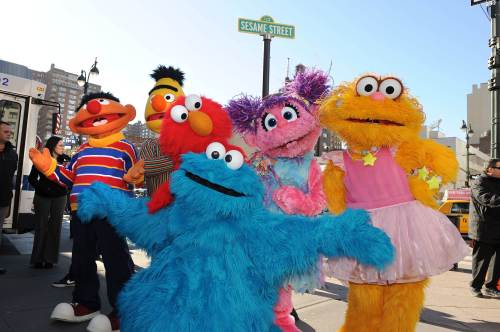ISLAMABAD (AFP) ― The United States has turned to oversized puppets in its newest attempt to win hearts and minds in Pakistan, funding a $20 million remake of popular children’s TV program Sesame Street.
The U.S. show that popularized characters like Big Bird, Oscar the Grouch and the Cookie Monster is being remade for a Pakistani audience, to promote “shared values and ideas” said USAID’s education chief in Islamabad, Larry Dolan.
Girl power and tolerance are among the messages to be spread by colorful puppets such as “Rani,” a science-loving 6-year-old girl with plaits who is friends with a teenage bookworm and a hard-working donkey.
But in a deeply conservative Muslim country where the Taliban bomb girls’ schools and millions of women live in “purdah,” meaning that they are concealed from men outside their family, such values are hardly universal.
The “Pakistan Children’s Television” show will broadcast 78 episodes from September, but in an impoverished country of up to 180 million people, only three million children are estimated to have access to the small screen.
The show’s makers hope to reach 700,000 children and 300,000 parents in total with the help of spin-off projects ― 600 live performances are planned across 90 districts, and books and multi-media versions are in the works.
Dolan says the show has entertained not only the West for more than 40 years, but been used to striking effect in other developing nations ― encouraging understanding of HIV in South Africa and girls’ freedom in Egypt.
 |
Sesame Street Live characters (left to right) Ernie, Bert, Elmo, Abby Cadabby, Zoe and Cookie Monster (front) celebrate the renaming of the corner of 31st Street and Eighth Avenue to “Sesame Street” outside Madison Square Garden in New York in February 2010. (AFP-Yonhap News) |
“It’s role is simply ― look at the society here and intolerance lies at the root of many many complex problems. The approach we are taking here with Pakistan TV is to promote tolerance,” said Dolan.
Rani’s father is a flower gardener and her mother a housewife, not educated but “adamant her daughter should have every opportunity in life,” according to a written brief of the characters, shown to AFP.
The donkey longs to be a pop star, “illustrating how, through hard work all dreams are possible” says the brief, encapsulating the American dream.
Dolan said USAID was giving $20 million to the Rafi Peer Theater Workshop in the city of Lahore, the creative directors of the show.
But he conceded that a portion of the funds ― albeit “less than half” ― would be given to the U.S.-based “Sesame Workshop,” who would advise on bringing children’s television to Pakistan.
Elmo ― the inquisitive high-energy fluffy red puppet who is one of the main characters of the American version of the show ― is the only character to make the cut in the South Asian remake.
“Elmo’s Pakistani cousin ‘illustrates the idea that questions are good and the world is a playground for exploration and discovery’” says the brief.
But the show will be set, not along “Sesame Street,” but around a rural street stall cafe.
“All the elements that represent Pakistan,” said the show’s maker Faizaan Peerzada. “This program is a gift to the children of Pakistan from the American people,” he said.
The U.S. government’s international aid agency spends billions of dollars of civilian aid, partly in a bid to assuage trenchant anti-Americanism throughout Pakistan, inflamed by a covert U.S. drone war on its soil.
But as Islamabad and Washington wage diplomatic battles over the war against the Taliban and al-Qaida on Pakistan’s lawless frontier with Afghanistan, the cultural battle may be no easier to win.
A critical report by USAID’s inspector general in February said such investments were failing to “demonstrate measurable progress.”
The national language Urdu is spoken as a first language by only a fraction of the country, and most of the shows will be translated into the regional tongues of Punjabi, Sindhi, Pashto and Balochi.
Sesame Street has been in Pakistan before ― televised in the early 1990s in English and later dubbed into national language Urdu.
But Peerzada said it is an ambitious project for a country with very limited children’s programming.
And he admits the workshop has been targeted in the past by Islamist militants waging war on anything seen to smack of Western liberalism.
“There’s a certain section of the Islamists who feel they must come and disrupt the whole country,” said Peerzada.
“But I think the program itself is the answer ... to teach children in a joyful and colorful way.”







![[Today’s K-pop] Blackpink’s Jennie, Lisa invited to Coachella as solo acts](http://res.heraldm.com/phpwas/restmb_idxmake.php?idx=644&simg=/content/image/2024/11/21/20241121050099_0.jpg)
